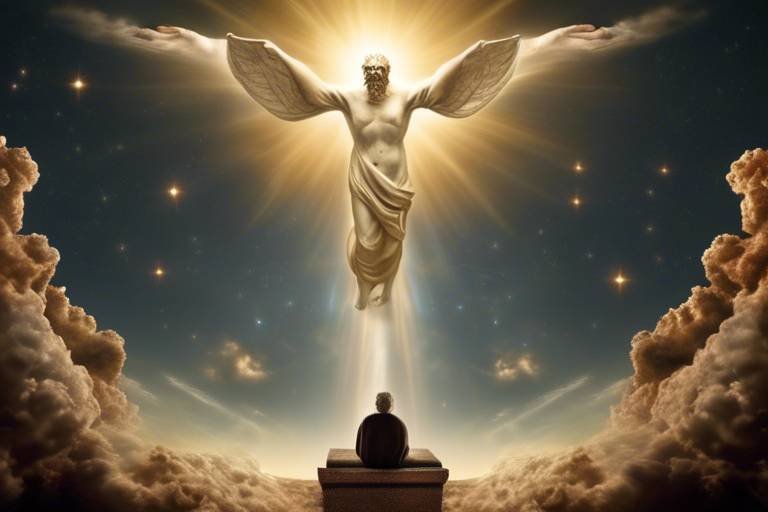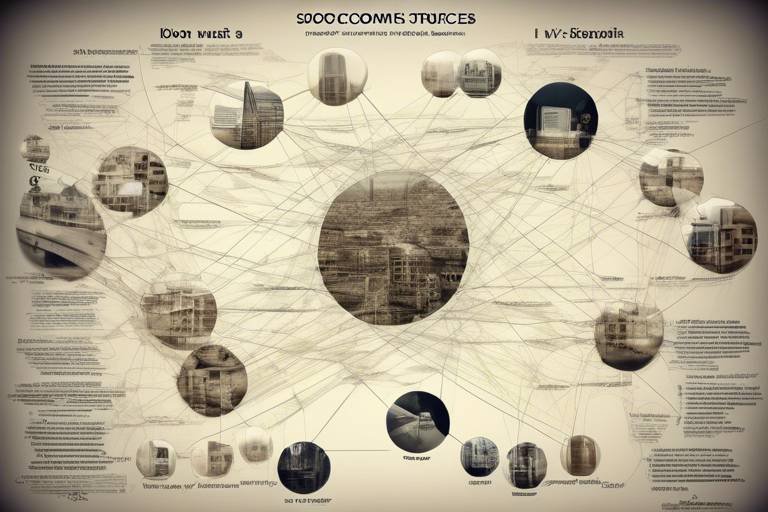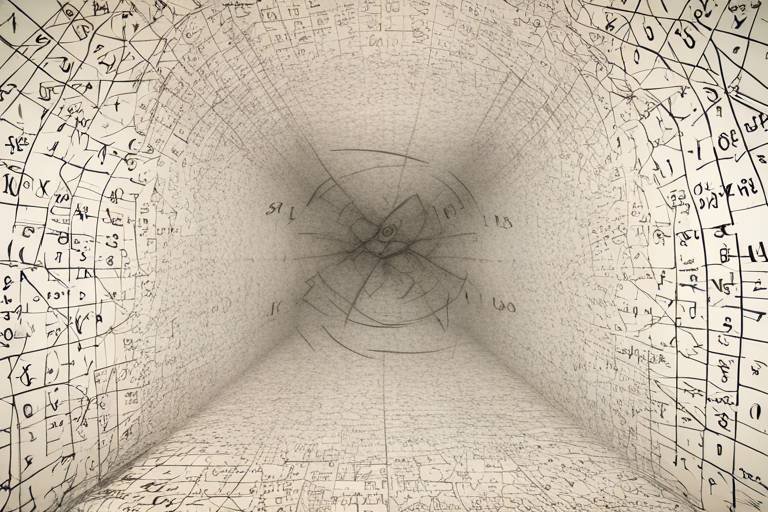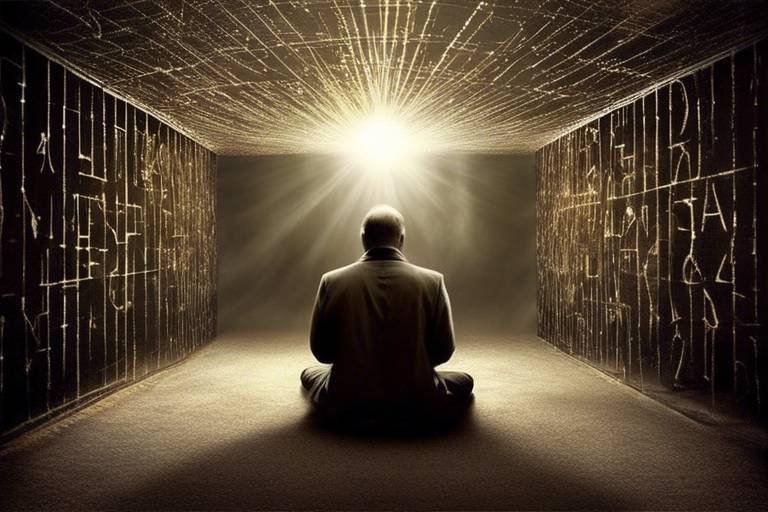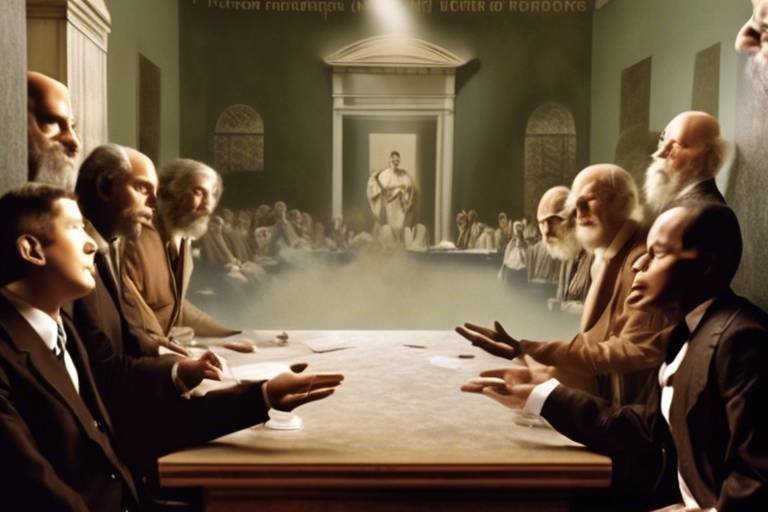Does Metaphysics Confirm the Existence of a Higher Power?
Have you ever gazed up at the stars and wondered if there’s something greater out there? The question of whether metaphysics confirms the existence of a higher power has intrigued thinkers for centuries. Metaphysics, the branch of philosophy that delves into the fundamental nature of reality, existence, and the universe, provides a fascinating lens through which we can explore this profound question. It’s like opening a door to a vast expanse of ideas that challenge our perceptions and beliefs about the universe and our place in it.
At its core, metaphysics grapples with questions that transcend the physical world. It invites us to ponder topics such as what it means to exist and whether there is a purpose behind our existence. Through this exploration, we often find ourselves faced with the concept of a higher power—a force or being that might explain the complexities of life and the universe. But does metaphysics truly provide evidence for such a being, or is it merely a philosophical playground for abstract ideas?
To navigate this intricate landscape, we must first understand the key principles of metaphysics. Think of it as a toolkit that helps us dissect the nature of reality. It encompasses various theories and arguments that either support or challenge the existence of a higher power. For instance, many metaphysical discussions revolve around the nature of causality and existence itself. If everything we see around us has a cause, could it be that there is an ultimate cause—a higher power—behind it all? This leads us to explore several philosophical arguments that have emerged over the years.
In the following sections, we will dive deeper into philosophical arguments such as the cosmological and teleological arguments, which propose that a higher power is not just a possibility but a necessity. These arguments provide a framework for understanding how metaphysical inquiries can affirm or question the existence of a divine entity. So, buckle up as we embark on this intellectual journey to uncover the intersections of metaphysics and spirituality!

Understanding Metaphysics
Metaphysics is one of those intriguing branches of philosophy that delves into the very essence of reality. Imagine standing at the edge of a vast ocean, gazing into its depths, trying to comprehend what lies beneath the surface. That's what metaphysics attempts to do—it seeks to uncover the fundamental nature of existence, being, and the universe itself. At its core, metaphysics grapples with questions that have puzzled humanity for centuries: What is real? What is the nature of being? Does the universe have a purpose? These questions are not just abstract musings; they resonate deeply with our spiritual inquiries and beliefs.
One of the key principles of metaphysics is the distinction between existence and essence. While existence refers to the state of being, essence delves into what it means to be something. For example, consider a tree: it exists in the physical world, but its essence encompasses its characteristics—like being a living organism that grows, reproduces, and interacts with its environment. This distinction is crucial when exploring the concept of a higher power, as it leads us to ponder whether such a being exists in a form that transcends our understanding of existence.
Moreover, metaphysics is not just an academic exercise; it has profound implications for spirituality. For many, the exploration of metaphysical concepts can lead to a deeper understanding of faith and the divine. It invites us to reflect on the interconnectedness of all things and the possibility that a higher power might be the ultimate source of existence. In this light, metaphysics serves as a bridge between philosophy and spirituality, allowing individuals to navigate their beliefs with a more profound sense of awareness.
To further illustrate the significance of metaphysics, let's consider a few of its fundamental areas:
- Ontology: The study of being and existence. It examines what entities exist and how they can be categorized.
- Causality: The exploration of cause and effect relationships. This is particularly relevant when discussing the origins of the universe.
- Space and Time: Investigating the nature of space and time and how they relate to our understanding of reality.
In summary, understanding metaphysics is essential for anyone interested in the big questions of life. It provides a framework for exploring the nature of reality and our place within it. As we dive deeper into this philosophical realm, we may find that it not only enriches our understanding of existence but also enhances our spiritual journey.

Philosophical Arguments for a Higher Power
The quest for understanding whether a higher power exists has captivated philosophers for centuries. Among the most influential discussions are the philosophical arguments that attempt to provide a rational basis for belief in such a being. These arguments, which include the cosmological and teleological perspectives, delve into the nature of existence and the universe itself. They aim to bridge the gap between the observable world and the metaphysical realm, suggesting that a higher power is not just a comforting notion but a logical conclusion drawn from our understanding of reality.
To better understand these arguments, let’s break them down into two primary categories:
- The Cosmological Argument: This argument posits that everything that exists has a cause. It leads us to consider the origins of the universe, ultimately suggesting that there must be an uncaused cause, which many interpret as God.
- The Teleological Argument: Also known as the argument from design, this perspective asserts that the complexity and order of the universe imply the existence of an intelligent designer. It invites us to marvel at the intricate details of nature, from the smallest cells to the vast cosmos.
These philosophical arguments do not merely stand alone; they intertwine with our existential inquiries about purpose and meaning. For instance, the cosmological argument invites us to ponder the very fabric of existence. If everything has a cause, what caused the universe? This line of questioning often leads to the conclusion that there must be a necessary being that initiated all existence—an idea that resonates with many spiritual traditions.
On the other hand, the teleological argument prompts us to reflect on the intricate design found in nature. Think about the human eye or the delicate balance of ecosystems; such complexity seems to suggest that there is more at play than mere chance. This argument can be particularly compelling, as it aligns with our innate sense of wonder and curiosity about the world around us.
However, it’s essential to recognize that while these arguments are powerful, they are not without their critiques. Some skeptics argue that the universe could be self-causing or that natural processes can explain the complexity we observe. Yet, the enduring nature of these arguments demonstrates their significance in philosophical discourse about the existence of a higher power.
In summary, the philosophical arguments for a higher power invite us to explore profound questions about existence, purpose, and the universe. They challenge us to look beyond the surface of reality and consider the deeper implications of our existence. Whether one finds these arguments convincing or not, they undeniably enrich the conversation around spirituality and metaphysics.
- What is the cosmological argument? The cosmological argument asserts that everything that exists has a cause, leading to the conclusion of a necessary being that caused the universe.
- What does the teleological argument propose? The teleological argument suggests that the complexity and order of the universe indicate the presence of an intelligent designer.
- Are there critiques of these arguments? Yes, critics argue that natural explanations for the universe's existence and complexity undermine the need for a higher power.

The Cosmological Argument
The cosmological argument is a fascinating philosophical proposition that seeks to explain the existence of the universe through the lens of causation. At its core, this argument asserts that everything that exists must have a cause. Think about it: if you see a tree, you instinctively know that it didn't just pop into existence out of nowhere. There was a seed, soil, sunlight, and water that contributed to its growth. Similarly, the cosmological argument extends this reasoning to the universe itself, suggesting that the universe must also have an originating cause.
One of the most compelling aspects of this argument is its reliance on the principle of sufficient reason. This principle states that everything must have an explanation or reason for its existence. If we accept this principle, we are led to a profound conclusion: there must be an ultimate cause that explains the existence of the universe. This ultimate cause is often interpreted as a necessary being, which many people equate with a higher power or God. In other words, if everything in our universe is contingent and requires a cause, then there must be something that is not contingent—something that exists out of necessity.
To illustrate this further, let's break down the concepts of contingent beings and a necessary being:
| Type of Being | Description |
|---|---|
| Contingent Being | A being that exists but could possibly not exist. Its existence depends on something else. |
| Necessary Being | A being that must exist and cannot not exist. Its existence is not contingent on anything else. |
In the context of the cosmological argument, the universe is filled with contingent beings—humans, animals, plants, and even stars. These beings rely on other factors for their existence, leading us to wonder: what is the ultimate source of all this? The answer, according to proponents of the cosmological argument, is a necessary being that serves as the foundation for everything else. This necessary being is often viewed as a higher power that transcends the universe itself.
However, it’s important to note that the cosmological argument is not without its critics. Some argue that the concept of causation may not apply to the universe as a whole. They question whether it’s valid to assume that the universe itself requires a cause. Yet, despite these critiques, the cosmological argument remains a significant point of discussion in metaphysical and theological debates.
In summary, the cosmological argument presents a compelling case for the existence of a higher power through its exploration of causation and the nature of existence. It invites us to ponder deep questions about our universe and the potential for a greater reality beyond what we can see. So, the next time you gaze up at the stars, consider the profound implications of the cosmological argument. Could there be a necessary being that set everything in motion?

The Principle of Sufficient Reason
The Principle of Sufficient Reason (PSR) is a fascinating philosophical concept that asserts everything must have an explanation or a reason for its existence. At its core, this principle challenges us to consider why things are the way they are and not otherwise. Imagine walking into a room filled with intricate machinery; you wouldn't just assume it appeared out of thin air. Instead, you'd look for the engineer or designer who created it. Similarly, the PSR compels us to seek out the underlying reasons for the universe's existence, leading us to ponder the necessity of a higher power.
To understand the implications of the PSR on the existence of a higher power, we can break it down into a few key ideas:
- Existence Requires Explanation: The PSR posits that for everything that exists, there must be a sufficient reason explaining its existence. This raises profound questions about the universe itself. If the universe exists, what is the reason behind it?
- Ultimate Cause: If we accept that every effect has a cause, we are led to consider the ultimate cause of everything. This ultimate cause is often interpreted as a necessary being or a higher power, which itself does not require an external explanation.
- Contingent vs. Necessary Beings: The PSR helps us distinguish between contingent beings (those that depend on something else for their existence) and necessary beings (those that exist independently). The universe, being contingent, suggests the need for a necessary being that explains its existence.
Philosophers like Gottfried Wilhelm Leibniz famously championed this principle, arguing that if everything were contingent, then there would be a time when nothing existed. But if that were the case, how could anything exist now? Leibniz's response was that there must be a necessary being—often identified with God—who provides the ultimate explanation for the existence of the universe.
However, the PSR is not without its challenges. Critics argue that the principle itself is not universally accepted, and some propose that the universe could exist without a specific reason. This brings us to a pivotal question: Is the PSR a fundamental truth of our reality, or is it merely a philosophical construct? The debate continues, but the exploration of the PSR undeniably enriches our understanding of existence and the potential for a higher power.
- What is the Principle of Sufficient Reason? The PSR states that everything must have an explanation or reason for its existence.
- How does the PSR relate to the existence of a higher power? The PSR suggests that if everything is contingent, there must be a necessary being that explains the existence of the universe, often interpreted as a higher power.
- Who was Gottfried Wilhelm Leibniz? Leibniz was a philosopher who advocated for the PSR and argued for the existence of a necessary being as the ultimate explanation for the universe.
- Are there criticisms of the PSR? Yes, some critics argue that the PSR is not universally accepted and propose that the universe could exist without a specific reason.

Contingency and Necessity
The distinction between contingent beings and a necessary being is pivotal in metaphysical discussions surrounding the existence of a higher power. To put it simply, contingent beings are those that depend on something else for their existence; they could either exist or not exist based on certain conditions. Think of a tree in your backyard. It exists because of specific factors: soil, sunlight, and water. If any of these conditions change drastically, the tree might not survive. In contrast, a necessary being is one that must exist; it cannot not exist. This concept is often linked to the idea of a higher power, which many argue must exist to explain the existence of everything else.
When we examine the universe, we see a vast array of contingent beings—from the smallest atom to the largest galaxy. If we accept that everything we observe is contingent, we are led to ask, "What is the ultimate cause of all this?" This question nudges us toward the idea of a necessary being, which many interpret as a higher power or God. The argument follows that if everything is contingent, there must be something that is not contingent to explain why anything exists at all.
To illustrate this further, let's consider a simple table that contrasts contingent beings and a necessary being:
| Aspect | Contingent Beings | Necessary Being |
|---|---|---|
| Definition | Entities that depend on external factors for existence | Entity that must exist and does not depend on anything else |
| Existence | Could exist or not exist | Cannot not exist |
| Examples | Plants, animals, planets | God, the universe itself (in some philosophies) |
In this light, the existence of contingent beings suggests a profound need for a necessary being. This is not just a philosophical exercise; it resonates deeply with many people's experiences of the world. When we look around, the intricate balance and interdependence of life often lead us to ponder whether there is a greater force or intelligence orchestrating it all.
However, this argument is not without its critics. Some suggest that the universe itself might be a necessary being, challenging the need for a higher power. They argue that the universe, with its laws and constants, could exist eternally without requiring an external cause. But for many, the discomfort of contemplating a universe without a higher purpose or cause is enough to keep the discussion alive.
Ultimately, the exploration of contingency and necessity opens a door to deeper questions about existence, purpose, and the nature of reality itself. As we navigate these philosophical waters, we find ourselves engaging not only with abstract concepts but also with the profound implications they hold for our understanding of life and the cosmos.
- What is the difference between contingent and necessary beings?
Contingent beings depend on external factors for their existence, while a necessary being must exist and is not reliant on anything else. - How does the concept of a necessary being relate to the existence of God?
The argument posits that a necessary being is often interpreted as a higher power or God, serving as the ultimate cause of all contingent beings. - Can the universe itself be considered a necessary being?
Some philosophers argue that the universe may exist eternally and does not require an external cause, challenging traditional notions of a higher power.

The Teleological Argument
The teleological argument—often referred to as the argument from design—presents a fascinating perspective on the existence of a higher power. Imagine walking through a forest and coming across a beautifully constructed watch lying on the ground. You wouldn't assume that it simply appeared there by chance; instead, you would likely conclude that there was a watchmaker who designed it with intention and purpose. This analogy captures the essence of the teleological argument, which asserts that the intricate complexity and order found in the universe point to an intelligent designer.
At the heart of this argument is the observation that the universe exhibits remarkable features that seem finely-tuned for life. From the precise distance of Earth from the sun to the intricate structures of biological organisms, these elements suggest a purposeful arrangement rather than random chance. Proponents of the teleological argument often cite several key aspects:
- Complexity: The complexity of living organisms and ecosystems is astounding. For instance, the human eye, with its intricate design, raises questions about how such complexity could arise without a guiding intelligence.
- Order: The laws of physics and chemistry operate in a remarkably consistent manner, allowing for the stability necessary for life. This order hints at a systematic designer behind the universe.
- Fine-tuning: Many argue that the universe is "fine-tuned" for life, meaning that if certain constants were even slightly different, life as we know it could not exist.
However, the teleological argument is not without its critics. Detractors often point to the possibility of natural selection and the theory of evolution as explanations for the complexity we observe. They argue that the appearance of design can arise from natural processes over vast periods of time, negating the need for a higher power. This leads to a critical examination of the strengths and weaknesses of the teleological argument.
One of the strengths of the teleological argument lies in its intuitive appeal. Most people, upon reflecting on the beauty and complexity of the universe, feel a sense of wonder that aligns with the idea of a designer. Moreover, the argument encourages a deeper exploration of our existence and the universe's mysteries. However, the weaknesses become apparent when we consider scientific advancements that provide natural explanations for phenomena previously attributed to divine intervention.
In conclusion, the teleological argument serves as a compelling point of discussion regarding the existence of a higher power. While it offers a perspective that resonates with many, it also invites us to engage with scientific explanations that challenge traditional views. Ultimately, the debate continues, encouraging individuals to reflect on their beliefs and the nature of existence itself.
- What is the teleological argument? The teleological argument, or argument from design, posits that the complexity and order in the universe imply the existence of an intelligent designer.
- How does the teleological argument relate to science? While the teleological argument suggests a designer, scientific explanations such as evolution provide alternative views on the complexity of life.
- What are some examples of complexity in the universe? Examples include the intricate structure of the human eye, the fine-tuning of the universe's physical constants, and the organized systems in ecosystems.
- Can the teleological argument prove the existence of God? The teleological argument is a philosophical perspective that supports the idea of a higher power but does not serve as definitive proof.

Metaphysical Perspectives on God
When we dive into the world of metaphysics, we find ourselves navigating through a rich tapestry of ideas that challenge our understanding of existence and the divine. This exploration often leads us to various metaphysical perspectives on God, each offering unique insights into the nature of a higher power. Two prominent viewpoints in this realm are idealism and dualism. Both perspectives not only shape our understanding of reality but also influence how we perceive the existence of a divine being.
Idealism posits that reality is fundamentally mental, suggesting that what we perceive as the physical world is a manifestation of the mind. This philosophical stance raises intriguing questions about the nature of God. If reality is essentially mental, then it implies that a transcendent higher power exists beyond the physical realm. In this context, God can be viewed as the ultimate consciousness, the source of all mental phenomena. The implications of idealism are profound: it suggests that our thoughts and beliefs are not merely products of biological processes but are instead connected to a greater divine reality. This connection can lead to a deeper understanding of spirituality, as believers may feel that their thoughts and intentions are part of a larger cosmic design.
On the other hand, dualism presents a different perspective by separating the mind and body. This distinction often leads to discussions about the soul and its relationship with the divine. Dualism suggests that while our physical bodies are bound by the laws of nature, our minds or souls exist in a separate, non-physical realm. This separation raises questions about the nature of God: if our souls are distinct from our bodies, does it mean that there is a higher spiritual reality that transcends our physical existence? Many dualists argue that this separation implies the existence of a higher power that governs the spiritual realm, providing a framework for understanding the divine's role in our lives.
To further illustrate these perspectives, consider the following table that summarizes the key differences between idealism and dualism:
| Aspect | Idealism | Dualism |
|---|---|---|
| Nature of Reality | Fundamentally mental | Separation of mind and body |
| View of God | Ultimate consciousness | Higher power governing the soul |
| Spiritual Implications | Connectedness to a divine reality | Existence of a spiritual realm |
Both idealism and dualism offer compelling frameworks for understanding God and our relationship with the divine. They invite us to ponder profound questions: Is God merely a construct of our minds, or is there an objective reality that exists beyond our perception? Can our souls exist independently of our physical bodies, and if so, what does that say about the nature of divinity? These metaphysical inquiries not only challenge our beliefs but also encourage us to explore the deeper meanings of life and existence.
In summary, metaphysical perspectives on God provide a rich landscape for exploration. Whether one leans towards idealism, viewing God as the ultimate mental reality, or dualism, seeing God as a higher power that transcends our physical existence, the conversation is both fascinating and essential. It encourages us to reflect on our beliefs, question our assumptions, and ultimately, seek a deeper understanding of the divine.
- What is metaphysics? Metaphysics is a branch of philosophy that examines the fundamental nature of reality, including concepts like existence, being, and the universe.
- How do idealism and dualism differ? Idealism suggests that reality is fundamentally mental, while dualism posits a separation between the mind and body.
- Can metaphysical arguments confirm the existence of God? Many metaphysical arguments, such as idealism and dualism, provide frameworks that support the belief in a higher power, though they are subject to critique.

Idealism and Divine Reality
When we dive into the fascinating world of idealism, we find ourselves in a realm where reality is not just a collection of physical objects but a tapestry woven from thoughts, perceptions, and consciousness. Idealism suggests that the universe is fundamentally mental, which raises intriguing questions about the nature of existence and, importantly, the existence of a higher power. Imagine for a moment that everything around you—your thoughts, feelings, and the very essence of the universe—is rooted in a grand, divine mind. This perspective can be incredibly liberating and, at the same time, deeply profound.
At its core, idealism posits that the material world is secondary to the mental world. This leads us to consider the implications for the concept of a divine reality. If reality is shaped by consciousness, then could it be that a supreme consciousness—often interpreted as God or a higher power—is the source of all that exists? This line of reasoning invites us to explore how a divine mind might manifest itself in our everyday experiences. After all, if everything we perceive is a reflection of a greater thought, then the universe itself could be seen as a manifestation of divine creativity.
Furthermore, idealism challenges us to rethink the relationship between humanity and the divine. Rather than viewing ourselves as isolated beings navigating a cold, indifferent universe, idealism encourages us to see ourselves as integral parts of a greater whole, interconnected through consciousness. This perspective can foster a sense of unity and purpose, suggesting that our thoughts and actions resonate within a divine framework. In this light, the existence of a higher power becomes not just a philosophical assertion but a lived experience, deeply woven into the fabric of our lives.
However, it’s important to note that idealism isn't without its critics. Some argue that the reliance on consciousness as the foundation of reality can lead to a form of solipsism—the idea that only one's mind is sure to exist. This raises important questions: If reality is entirely mental, how do we account for the shared experiences and physical laws that govern our universe? Yet, proponents of idealism contend that these shared experiences can still be understood as manifestations of a collective consciousness, further affirming the existence of a divine reality.
In summary, idealism offers a compelling framework for understanding the divine. It invites us to consider that our reality is not just a series of random occurrences but rather a reflection of a higher, conscious order. Through this lens, the existence of a higher power becomes a natural conclusion, as the universe unfolds from the thoughts of a divine mind. As we continue to explore these profound ideas, we find ourselves not only contemplating the nature of existence but also our place within this magnificent tapestry of life.

Dualism and the Divine
When we dive into the concept of dualism, we're stepping into a fascinating philosophical territory that separates the mind and body into distinct entities. This separation raises intriguing questions about the nature of existence and the divine. Think of it like a two-part play where the mind is the actor and the body is the stage. Each plays a crucial role, yet they exist independently, leading us to ponder the implications for our understanding of a higher power.
In dualistic thought, particularly as articulated by philosophers like René Descartes, the mind is often seen as a non-physical substance, while the body is physical. This distinction opens up a realm of possibilities regarding the existence of a divine being. If the mind can exist separately from the body, could it be that our consciousness or soul connects us to a higher spiritual reality? Many dualists argue that the existence of a non-material mind suggests the presence of something greater than ourselves, something that transcends the physical world.
Moreover, dualism encourages us to explore the nature of the soul. If we accept that the soul exists independently of the body, it leads to profound implications about our spiritual journey. It raises questions such as:
- What is the nature of the soul?
- How does the soul interact with the divine?
- Is the soul immortal, and what does that mean for our understanding of a higher power?
These questions are not merely academic; they resonate deeply with our personal experiences and beliefs. For many, the idea of a soul that exists beyond the physical realm aligns with the belief in a divine being. This connection can provide comfort and meaning, especially when faced with life's uncertainties.
However, dualism also invites skepticism. Critics argue that separating the mind and body might lead to a fragmented understanding of human existence. If we view the mind as separate from the body, can we truly grasp the holistic nature of our being? This perspective challenges the notion of a divine entity that is intimately connected with all aspects of existence. After all, if the divine is present in our physical reality, how can we justify a separation?
In conclusion, dualism offers a rich framework for exploring the divine. While it presents compelling arguments for the existence of a higher power through the lens of the soul and consciousness, it also invites us to question the completeness of this separation. As we navigate these philosophical waters, we find ourselves at the intersection of spirituality and existential inquiry, continuously seeking to understand our place in the universe and the possibility of a higher power that transcends our physical existence.
- What is dualism? Dualism is a philosophical concept that posits the separation of the mind and body into distinct entities.
- How does dualism relate to the belief in a higher power? Dualism suggests that the existence of a non-physical mind or soul could indicate the presence of a divine being.
- Can dualism coexist with scientific explanations of consciousness? While dualism and scientific perspectives can sometimes clash, many find a way to integrate both views in their understanding of the mind and the divine.
- What are the implications of dualism on spirituality? Dualism encourages individuals to explore their spiritual beliefs and consider the existence of a soul that connects them to a higher power.

Critiques of Metaphysical Arguments
While metaphysical arguments for the existence of a higher power are intriguing and often compelling, they are not without their critiques. One of the most significant challenges comes from the Problem of Evil. This philosophical dilemma questions how a benevolent and omnipotent higher power could allow suffering and evil to exist in the world. If a higher power is all-knowing and all-good, why do natural disasters, diseases, and injustices occur? This question has led many to doubt the validity of metaphysical claims regarding divinity, suggesting that a truly benevolent higher power could not permit such suffering.
Moreover, the rise of scientific explanations provides a substantial counterargument to metaphysical assertions. As science continues to unravel the mysteries of the universe, many phenomena that were once attributed to divine intervention now have natural explanations. For instance, the complexity of life can be explained through evolutionary biology, and the formation of the universe is being explored through cosmology and physics. This shift in understanding can undermine the need for a higher power as the ultimate cause of existence.
Additionally, skeptics often argue that metaphysical arguments rely heavily on human intuition and subjective reasoning rather than empirical evidence. They point out that just because we desire to find meaning or a higher purpose does not necessarily validate the existence of such a being. This reliance on subjective experience raises questions about the objectivity of metaphysical reasoning.
In the context of these critiques, it’s essential to consider the implications of atheistic and agnostic perspectives. Atheists argue that the absence of empirical evidence for a higher power is sufficient reason to reject the notion altogether. Agnostics, on the other hand, maintain that the existence of a higher power is ultimately unknowable, suggesting that metaphysical arguments may not provide the definitive answers that believers seek.
In light of these critiques, it’s vital to engage in a thoughtful dialogue about the nature of belief and the role of metaphysics in our understanding of existence. While metaphysical arguments offer a framework for exploring the idea of a higher power, the challenges they face remind us of the complexity of the human experience and the diverse perspectives that shape our beliefs.
- What is the Problem of Evil? The Problem of Evil questions how a benevolent higher power can allow suffering and evil to exist in the world.
- How does science challenge metaphysical arguments? Science provides natural explanations for phenomena that were once attributed to a higher power, diminishing the necessity of such a being.
- What do atheists believe regarding a higher power? Atheists generally reject the notion of a higher power due to a lack of empirical evidence supporting its existence.
- Can metaphysical arguments coexist with scientific explanations? Some argue that metaphysical arguments can complement scientific understanding, while others see them as fundamentally at odds.

The Problem of Evil
The problem of evil is one of the most significant challenges to the belief in a benevolent higher power. It raises profound questions: If a higher power exists and is all-good, all-knowing, and all-powerful, why does evil exist in the world? This dilemma has perplexed philosophers, theologians, and everyday people alike for centuries. It forces us to confront the uncomfortable reality of suffering, pain, and injustice that permeate human existence.
To better understand this problem, let’s break it down into a few key points:
- Types of Evil: Evil can be categorized into two main types: moral evil and natural evil. Moral evil refers to the wrongdoings caused by human actions, such as violence, theft, and betrayal. Natural evil, on the other hand, encompasses suffering caused by natural disasters, diseases, and other uncontrollable events.
- The Logical Problem of Evil: This argument posits that the existence of evil logically contradicts the existence of an all-powerful, all-good God. If God is all-powerful, He could prevent evil, and if He is all-good, He would want to prevent it. Yet, evil exists, leading to the conclusion that such a God may not exist.
- The Evidential Problem of Evil: Unlike the logical problem, this argument suggests that while the existence of evil does not outright disprove God’s existence, the sheer amount and intensity of suffering provide strong evidence against the likelihood of a benevolent deity.
Philosophers like Epicurus and David Hume have famously articulated this dilemma, questioning the compatibility of a loving God with the observable reality of suffering. Epicurus famously posed the question: "Is God willing to prevent evil, but not able? Then he is not omnipotent. Is he able, but not willing? Then he is malevolent. Is he both able and willing? Then whence cometh evil?" This line of questioning highlights the tension between faith and the harsh realities of life.
Moreover, the existence of evil can lead to a crisis of faith for many individuals. When faced with personal tragedy or widespread suffering, believers may struggle to reconcile their faith with their experiences. This struggle can lead to feelings of abandonment or doubt about the divine nature of God. The emotional turmoil that arises from such experiences is real and profound, often leading individuals to question their beliefs and search for answers.
In response to the problem of evil, various theological perspectives have emerged. Some argue that evil is a necessary consequence of free will; that God grants humanity the freedom to choose, which inevitably leads to moral failings. Others propose that suffering can lead to personal growth or spiritual development, suggesting that there can be a greater purpose behind the pain we endure. However, these responses often seem inadequate when faced with the magnitude of suffering in the world.
Ultimately, the problem of evil serves as a critical point of discussion in the intersection of metaphysics and spirituality. It challenges believers to reflect on their understanding of God and the nature of existence. While it may not provide definitive answers, grappling with this issue can lead to a deeper exploration of faith and the complexities of the universe.
- What is the problem of evil? The problem of evil questions how a benevolent and omnipotent God can allow evil and suffering in the world.
- How do philosophers address the problem of evil? Philosophers like Epicurus and Hume argue that the existence of evil contradicts the nature of an all-good, all-powerful God.
- Can suffering have a purpose? Some argue that suffering can lead to personal growth or serve a greater purpose, though this is often debated.

Scientific Explanations
Advancements in science have dramatically reshaped our understanding of the universe, providing natural explanations for phenomena that were once attributed to a higher power. This shift has led many to question the validity of metaphysical arguments in favor of a divine being. It's fascinating to think about how, for centuries, people looked to the heavens and attributed the mysteries of life to a supernatural force. However, as our knowledge has expanded, so too has our ability to explain the seemingly inexplicable.
For instance, consider the intricate processes of evolution. Charles Darwin's theory of natural selection offers a compelling explanation for the diversity of life on Earth, suggesting that complex organisms can arise from simpler forms without the need for an intelligent designer. This idea challenges the teleological argument, which posits that the complexity of the universe implies a purposeful creator. If natural processes can account for the complexity we observe, where does that leave the notion of a higher power?
Furthermore, scientific discoveries in fields like cosmology and physics have provided insights into the origins of the universe. The Big Bang theory, for example, describes how the universe expanded from a singular point approximately 13.8 billion years ago. This explanation raises profound questions about the necessity of a divine creator. If the universe can emerge from a singularity and evolve through natural laws, does that not suggest that a higher power is not essential to its existence?
To illustrate the contrast between scientific and metaphysical explanations, consider the following table:
| Aspect | Scientific Explanation | Metaphysical Explanation |
|---|---|---|
| Origin of the Universe | Big Bang Theory | Creation by God |
| Diversity of Life | Evolution through Natural Selection | Design by an Intelligent Creator |
| Natural Phenomena | Laws of Physics | Divine Intervention |
This table highlights the stark differences between scientific and metaphysical explanations. While science relies on empirical evidence and observable phenomena, metaphysical arguments often depend on faith and subjective interpretations. The challenge for those who believe in a higher power is reconciling these two perspectives. Can one accept scientific explanations while still maintaining a belief in the divine?
Moreover, the rise of atheism and agnosticism in modern society has led to a cultural shift where scientific rationality often overshadows spiritual interpretations. Many individuals find comfort in the idea that science can explain the universe without invoking a higher power. This perspective encourages critical thinking and skepticism, promoting a worldview grounded in evidence rather than faith.
In conclusion, while metaphysical arguments for a higher power are compelling and have been central to human thought throughout history, the advancements in science present significant challenges. As we continue to explore the mysteries of existence, the dialogue between science and spirituality remains vibrant and complex, inviting us to ponder the ultimate questions of our existence.
- What is the primary argument against the existence of a higher power? Many argue that scientific explanations for the universe's origins and the complexity of life negate the need for a divine creator.
- Can science and spirituality coexist? Yes, many people find ways to integrate scientific understanding with their spiritual beliefs, viewing them as complementary rather than contradictory.
- What role does faith play in understanding metaphysics? Faith often provides a framework for interpreting metaphysical concepts, allowing individuals to find meaning in existence beyond empirical evidence.

Conclusion: The Intersection of Metaphysics and Faith
In wrapping up our exploration of metaphysics and its relationship with the belief in a higher power, it's essential to recognize that this topic is as deep as the ocean and as vast as the universe itself. Metaphysics probes into the very fabric of reality, questioning existence, being, and the nature of the universe. For many, these inquiries are not just abstract concepts but are deeply intertwined with their spiritual beliefs and personal faith.
As we've seen, philosophical arguments like the cosmological and teleological arguments provide compelling reasons to consider the existence of a higher power. They invite us to ponder profound questions: What caused the universe? Why does it exhibit such intricate design? These inquiries can lead to a sense of wonder and awe, suggesting that there might be something greater than ourselves at play.
However, the journey through metaphysics isn't solely about affirming the existence of a divine entity. It also opens the door to skepticism and critical thought. The critiques, such as the problem of evil and the rise of scientific explanations for phenomena once attributed to divine intervention, challenge us to refine our beliefs. They push us to confront uncomfortable truths and consider the complexities of faith in light of reason.
Ultimately, the intersection of metaphysics and faith is not a linear path but a winding road filled with questions, doubts, and revelations. For some, the exploration of metaphysical concepts can deepen their faith, providing a framework that enriches their spiritual experience. For others, it may lead to a more agnostic or atheistic viewpoint, emphasizing the importance of evidence and reason. Regardless of where one lands on this spectrum, the dialogue between metaphysics and spirituality remains vital.
In this light, engaging with metaphysical questions can be seen as a spiritual practice in itself. It invites us to reflect on our beliefs, challenge our assumptions, and ultimately, seek a deeper understanding of our place in the universe. Whether one finds solace in the idea of a higher power or embraces a more secular worldview, the pursuit of knowledge and understanding is a journey worth taking.
- What is metaphysics? Metaphysics is a branch of philosophy that examines the fundamental nature of reality, including concepts of existence, being, and the universe.
- How do philosophical arguments support the existence of a higher power? Arguments like the cosmological and teleological arguments suggest that the universe's existence and complexity imply a cause or designer, often interpreted as a higher power.
- What are the critiques of metaphysical arguments? Critiques include the problem of evil, which questions the existence of a benevolent higher power in light of suffering, and scientific explanations that provide natural reasons for phenomena attributed to divinity.
- Can metaphysics and faith coexist? Yes, many find that metaphysical inquiries can enrich their faith, while others may use these discussions to challenge or redefine their beliefs.
Frequently Asked Questions
- What is metaphysics?
Metaphysics is a branch of philosophy that explores the fundamental nature of reality. It delves into concepts like existence, being, and the universe, seeking to understand what lies beyond the physical world.
- How does metaphysics relate to spirituality?
Metaphysics and spirituality intersect as both seek to understand the deeper meaning of existence. While metaphysics provides philosophical frameworks, spirituality often involves personal beliefs and experiences related to a higher power.
- What is the cosmological argument?
The cosmological argument suggests that everything that exists has a cause. It posits that there must be a necessary being, often interpreted as a higher power, that initiated the existence of everything else.
- What is the teleological argument?
The teleological argument, also known as the argument from design, asserts that the complexity and order of the universe imply the existence of an intelligent designer. This argument supports the belief in a higher power by highlighting the apparent purpose in nature.
- What critiques exist against metaphysical arguments for a higher power?
Critiques against metaphysical arguments often include the problem of evil, which questions how a benevolent higher power could allow suffering. Additionally, scientific advancements provide natural explanations for phenomena that were once attributed to divine intervention.
- How do idealism and dualism contribute to the discussion of a higher power?
Idealism suggests that reality is fundamentally mental, which can affirm the existence of a transcendent higher power. Dualism, on the other hand, separates mind and body, leading to discussions about the soul and its connection to a spiritual reality.
- Can scientific explanations undermine the belief in a higher power?
Yes, scientific explanations can challenge metaphysical arguments for a higher power by providing natural causes for events and phenomena that were previously thought to require divine intervention. This has led some to question the necessity of a higher power in explaining existence.
- What is the significance of the principle of sufficient reason?
The principle of sufficient reason states that everything must have an explanation or cause. This principle supports the idea of a higher power by asserting that the universe itself must have an ultimate cause or reason for its existence.



